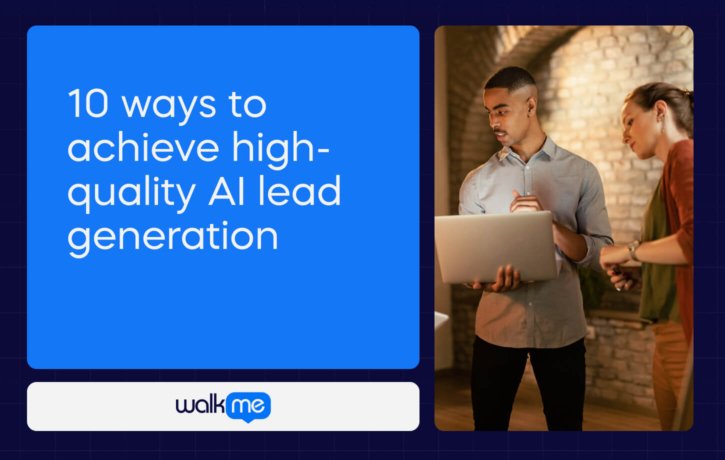Artificial intelligence (AI) is used for many business processes today, but are you utilizing it for lead generation?
AI lead generation is an efficient way of finding vast numbers of customers using AI tools, unlocking the time your staff needs to develop techniques to support these customers and encourage them to be loyal to your brand via hatGPT.
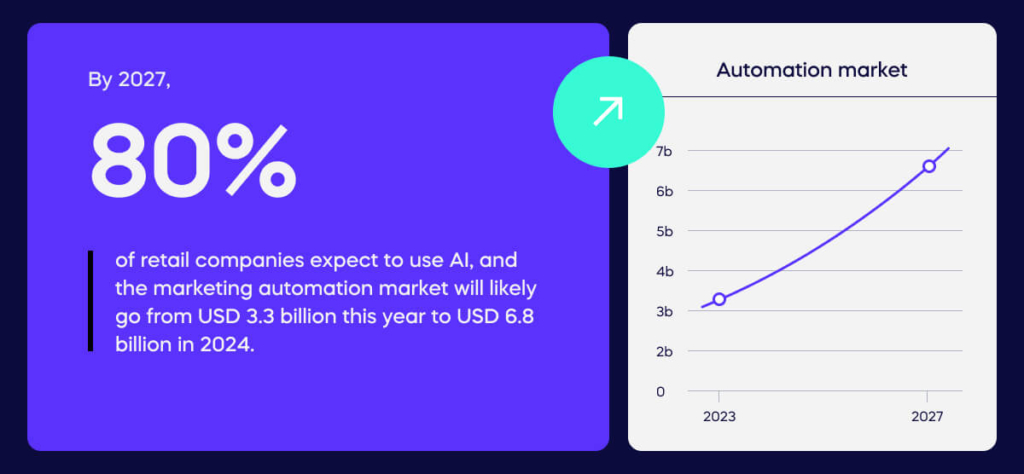
If these figures make you as excited as we are, stick around for our top ten ways to achieve high-quality AI lead generation to tame the sales tech beast below.
This article covers the essential aspects of AI lead generation, including its definition, significance in the current landscape, and a detailed exploration of the ten most effective strategies for achieving high-quality leads.
What is AI lead generation?
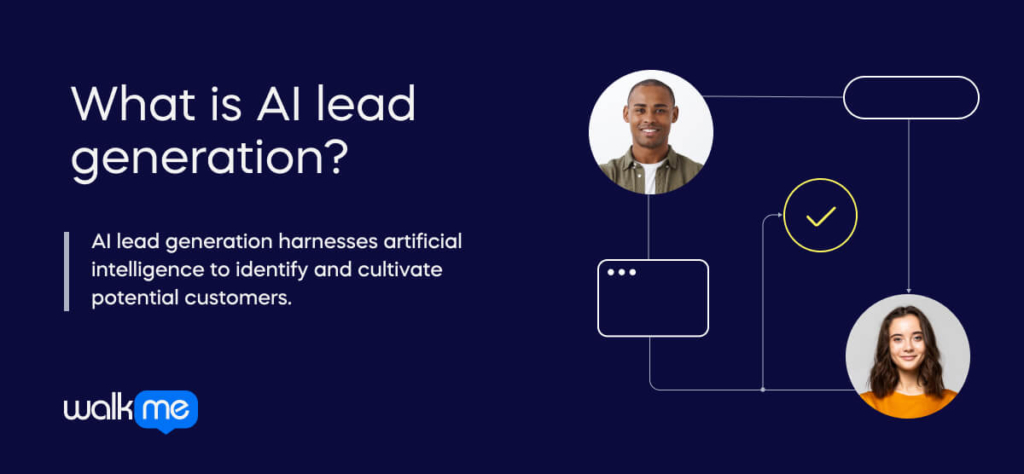
AI lead generation harnesses artificial intelligence to identify and cultivate potential customers.
AI optimizes the process through advanced algorithms and data analysis, enhancing efficiency and accuracy in targeting and engaging prospects, ultimately driving business growth.
An example of AI lead generation involves employing machine learning algorithms to analyze user behavior and data patterns on a website, thereby identifying and qualifying potential leads for a more targeted marketing approach.
Why is AI lead generation essential today?
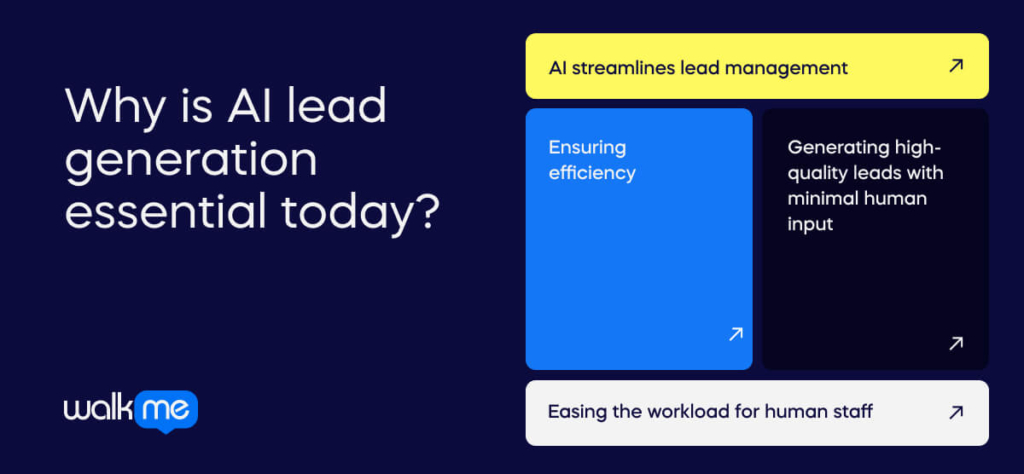
Digitization has revolutionized lead generation methodologies, breaking free from conventional practices like event hosting and cold calling.
Businesses implement omnichannel strategies, leveraging emails, websites, apps, and social media to reach a wider audience.
Yet, intricate sales cycles across communication channels challenge marketing and sales teams, leading to laborious lead management. AI streamlines this process, ensuring efficiency and generating high-quality leads with minimal human input, easing the workload for human staff.
10 best ways to achieve high-quality AI lead generation
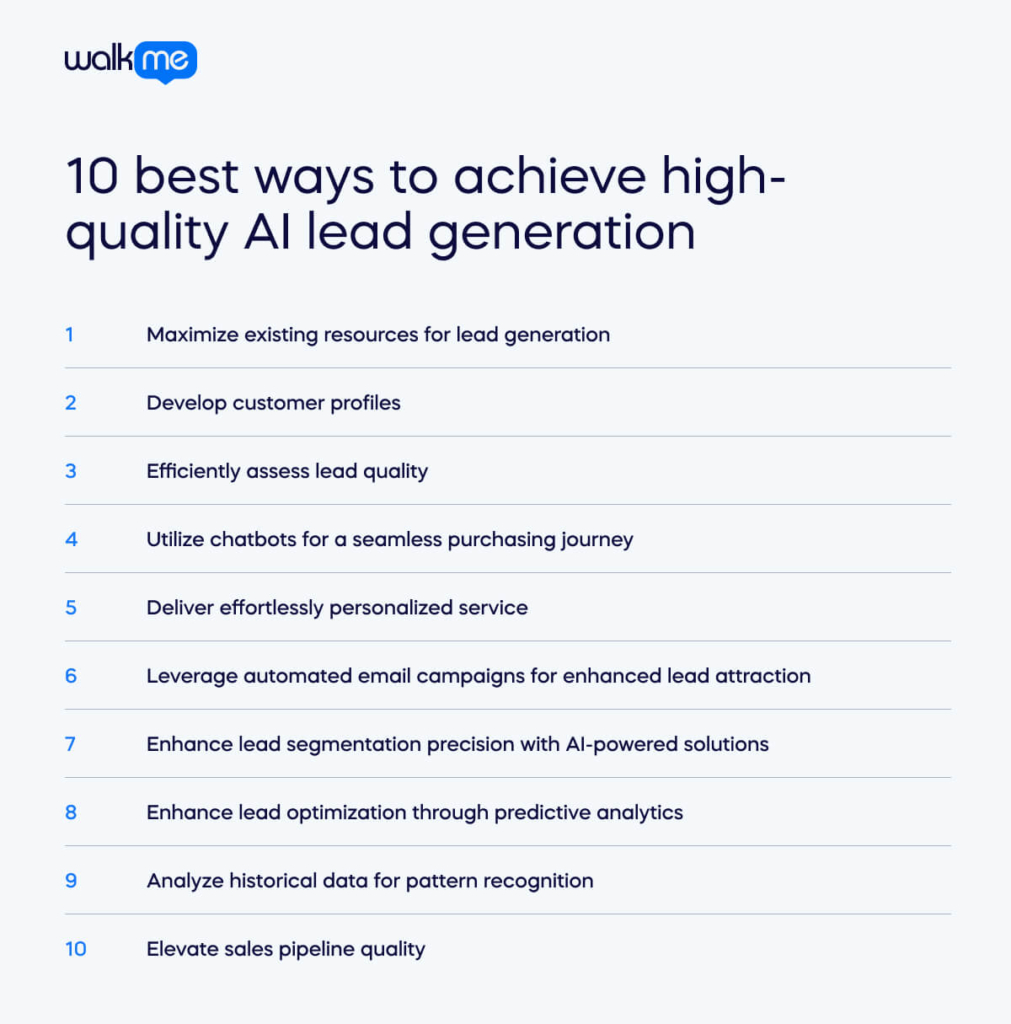
The use of AI in lead generation is a game-changer.
It’s like having a super-smart assistant that quickly sifts through heaps of data, hones in on the right targets, and automates tasks. For businesses striving to stay ahead and navigate the twists and turns of modern marketing, it’s a must-have tool.
There are ten best ways to achieve high-quality AI lead generation, starting with maximizing resources:
1. Maximize existing resources for lead generation
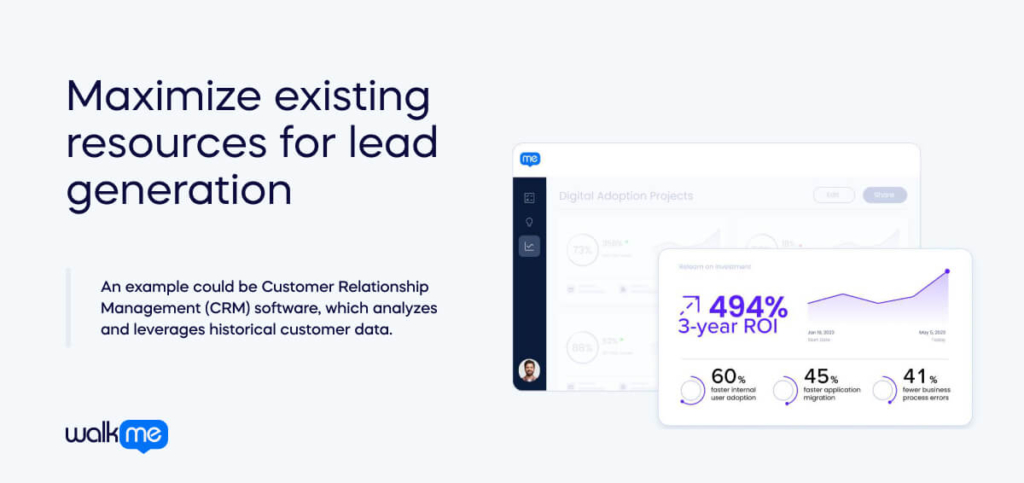
Your business may already possess AI-driven tools suitable for lead generation.
Implement strategic processes and technologies to efficiently leverage existing assets. This approach minimizes costs, enhances productivity, and ensures a streamlined, high-impact lead-generation strategy tailored to your business needs.
An example could be Customer Relationship Management (CRM) software, which analyzes and leverages historical customer data. Implement advanced analytics to identify patterns and preferences, allowing targeted marketing efforts. Businesses can maximize resources for precise lead generation and strategic customer engagement by harnessing existing customer information.
2. Develop customer profiles
With abundant website traffic and some converting to customers, identifying and targeting similar prospects becomes crucial.
Formulate buyer personas based on the characteristics of your ideal customers. Initially, craft these personas through primary research.
However, leverage AI for lead generation as your business expands and data accumulates.
AI and machine learning (ML) systems analyze transactional and behavioral data, refining buyer personas for personalized targeting.
This action enables tailored marketing strategies, optimizing ROI from lead generation efforts.
Utilize AI to discover potential prospects
- In the B2B realm, employ tools like ChatGPT to identify accounts aligning with your Ideal Customer Profile (ICP).
- Run digital ad campaigns or refine and prioritize account lists through additional research. Utilize prompts such as “Find [X] companies like [Company Name]” to enhance account-based marketing.
- Further narrow down prospects by prompting ChatGPT to analyze additional criteria, tailoring your approach for effective lead generation.
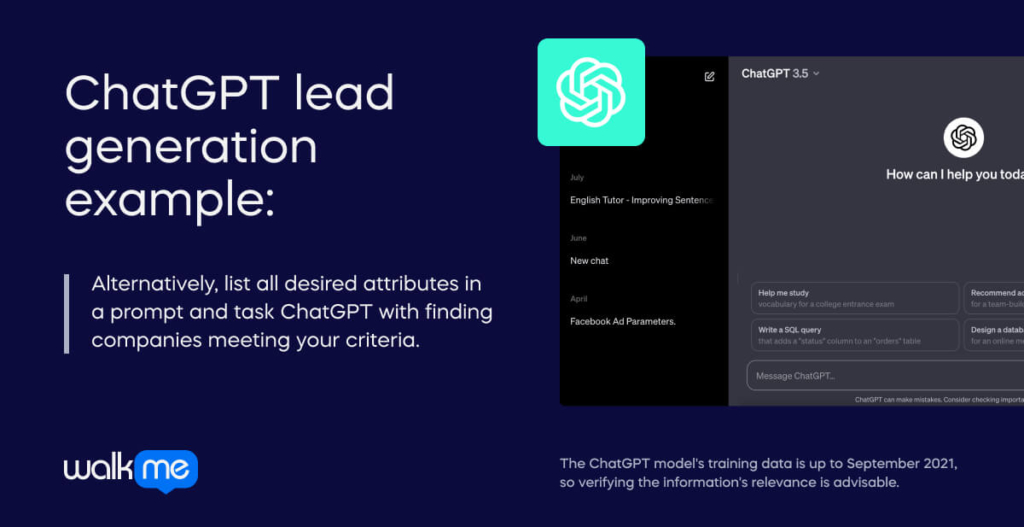
ChatGPT lead generation example:
Alternatively, list all desired attributes in a prompt and task ChatGPT with finding companies meeting your criteria.
The ChatGPT model’s training data is up to September 2021, so verifying the information’s relevance is advisable.
3. Efficiently assess lead quality
Predictive AI-powered lead scoring aims to aid in lead capture using ChatGPT with CRM to qualify leads ready for engagement with sales and marketing teams.
However, why not inquire if the leads are ready for the next step in the lead-generation process?
Engaging leads manually through emails demands significant time and valuable marketing resources. Enter AI for lead generation.
AI-powered tools can streamline this process, generating email lists from the leads database and dispatching personalized messages. As your AI tool processes prospect responses, it identifies patterns and correlations, enhancing the intelligence of lead scoring.
Managing multiple email campaigns introduces complexity, with diverse target audiences, Ideal Customer Profiles (ICPs), and myriad email marketing metrics.
This complexity often results in challenges in discerning why some campaigns outperform others.
4. Utilize chatbots for a seamless purchasing journey
Simplifying the customers’ buying process hinges on effective communication.
An AI-powered ChatBot can automate customer interactions, offering businesses a timely opportunity to integrate them into customer-facing interfaces and enhance lead generation.
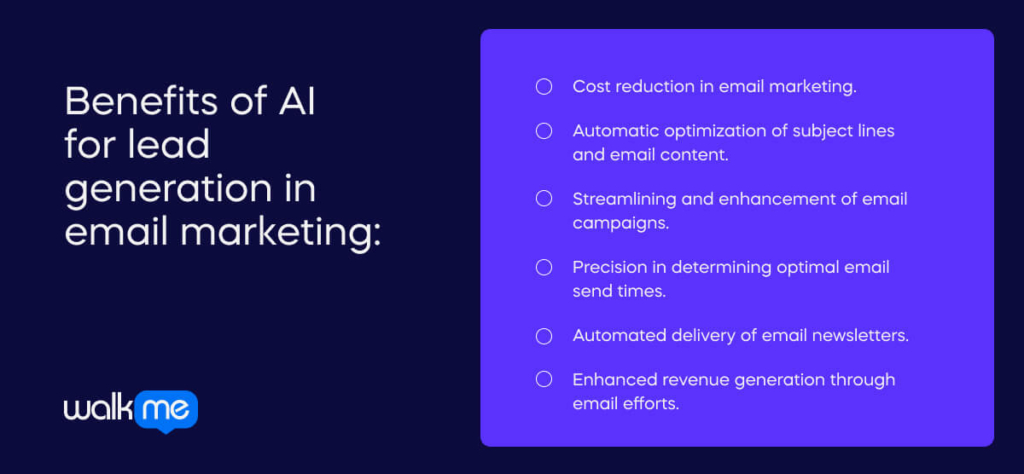
Benefits of incorporating AI-powered chatbots in lead generation include:
- 24/7 availability.
- Instant response.
- Assistance throughout the purchase process.
- Hyper-personalization for customers.
- Omni-channel implementation capability.
- Multilingual support.
- Cost-efficient customer interaction.
These advanced chatbots utilize predefined questionnaires to encourage website visitors to share their details.
They can also qualify and nurture leads based on their customer journey, tailoring interactions to individual needs.
5. Deliver effortlessly personalized service
Personalization is a crucial trend for enhancing customer experiences in the current marketing landscape.
AI empowers brands to infuse personalization into their lead-generation strategies by processing extensive customer behavior data. AI-powered tools glean insights from these datasets, enabling personalized marketing communication.
Additionally, AI algorithms recommend products or services based on lead preferences, mirroring the success of OTT platforms’ recommendation engines that suggest content aligned with users’ watch history and preferences.
6. Leverage automated email campaigns for enhanced lead attraction
Harness the power of AI-driven lead generation tools to automate and elevate your email marketing endeavors.
These tools utilize prospects’ browsing histories to craft personalized emails. AI algorithms analyze email marketing metrics, discerning practical elements and areas for improvement. This insight guides optimizing email content, subject lines, and delivery timing.
Once armed with substantial lead data, AI-powered tools facilitate the restructuring of email campaigns and the refinement of email lists.
Explore the benefits of AI for lead generation in email marketing:
- Cost reduction in email marketing.
- Automatic optimization of subject lines and email content.
- Streamlining and enhancement of email campaigns.
- Precision in determining optimal email send times.
- Automated delivery of email newsletters.
- Enhanced revenue generation through email efforts.
7. Enhance lead segmentation precision with AI-powered solutions
AI-driven solutions refine lead segmentation, a critical aspect of personalized communication and services utilizing clustering algorithms.
AI algorithms ensure that tailored content reaches the right audience at the optimal moment, requiring accurate lead segmentation based on predefined attributes such as sales lifecycle stage, likelihood to buy, and lead source.
For instance, leads acquired through free eBooks or PDFs know your services. AI tools can segment them separately, enabling personalized marketing communication.
Program your AI lead generation tool to offer these leads exclusive discounts and free trials, recognizing their advanced position in the buying journey.
8. Enhance lead optimization through predictive analytics
Integrating AI into lead generation introduces predictive analytics, elevating sales performance.
Predictive analytics empower marketers to identify leads that promise quicker and superior results, refining marketing strategies.
AI-driven predictive analytics leverage existing data to pinpoint ideal customers within the lead pool. This targeted approach reduces the time spent on campaigns for less likely conversions.
Focused marketing communication for filtered leads improves the likelihood of successful conversions.
9. Analyze historical data for pattern recognition
Marketing requires continual adjustment to evolving customer needs. AI for lead generation aids in this process.
AI technology excels at analyzing data to identify patterns.
The data analysis feature enables proactive evaluation of how visitors transition into leads, forming successful lead generation patterns.
Identifying high-performing campaigns and conversions equips marketers to shape future strategies effectively.
10. Elevate sales pipeline quality
The core of business success lies in sales pipelines, but challenges persist in refining funnels and strategizing for upsells.
AI technology proves instrumental in overcoming these lead generation hurdles. AI-powered software ensures accurate lead scoring, devoid of subjective bias, refining the sales funnel efficiently.
As discussed earlier, AI algorithms excel in pattern recognition, automatically scoring leads and enabling focus on high-quality leads with more significant conversion potential.
By incorporating machine learning, AI can analyze past interactions with individual leads, predicting their interest in additional services. This targeted approach allows marketers to concentrate on specific products or services tailored to each lead’s preferences.
Insights into leads’ preferences eliminate guesswork for sales staff, reducing the risk of losing leads due to ineffective communication.
Leverage AI to gain high-quality leads today
Pioneer AI lead generation by weaving advanced tools seamlessly into your business strategy. With platforms like WalkMe, infuse your Customer Relationship Management (CRM) with AI capabilities, gaining deeper insights into your leads.
Fine-tune your approach with predictive lead scoring algorithms, meticulously assessing and segmenting potential customers. Embrace the human touch through Natural Language Processing (NLP) algorithms, tailoring communications to individual preferences.
Augment your analytics arsenal with tools like Google Analytics, extract actionable insights to refine your sales pipeline using dynamic forecasting models, and dive into real-time engagement by incorporating AI-powered chatbots such as Dialogflow or Microsoft Bot Framework, adding a personalized touch to lead qualification.

